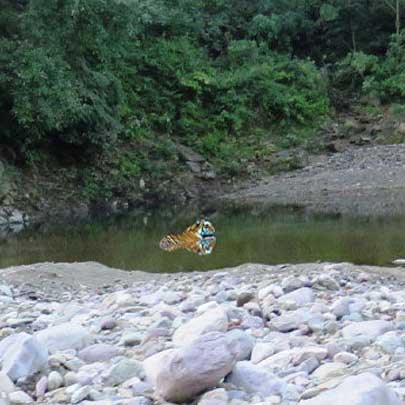Eco-Tourism At Pilibhit Tiger Reserve: A Sustainable Travel Guide
Nestled in the Terai region of Uttar Pradesh, Pilibhit Tiger Reserve is a hidden gem for eco-tourists and wildlife enthusiasts. This reserve, with its dense forests, diverse wildlife and emphasis on conservation, offers a unique opportunity to experience the beauty of nature while promoting sustainable travel practices.
In this guide, we’ll explore how you can make the most of your visit to Pilibhit Tiger Reserve while minimizing your environmental impact and supporting conservation efforts.
1. Why Choose Pilibhit for Eco-Tourism?
Pilibhit Tiger Reserve is one of India’s lesser-known tiger reserves, offering a tranquil escape for nature lovers. Unlike more commercialized reserves, Pilibhit provides a peaceful environment where you can enjoy wildlife sightings without the large crowds. The reserve is home to Bengal tigers, leopards, sloth bears and various bird species, making it an ideal destination for those interested in biodiversity.

What sets Pilibhit apart is its commitment to sustainable tourism. Efforts are made to preserve the delicate balance between wildlife conservation and tourism, allowing visitors to experience nature responsibly.
2. Sustainable Travel Tips for Pilibhit Tiger Reserve
It's important to adopt eco-friendly travel practices to reduce your impact on the environment; when visiting a sensitive ecosystem like Pilibhit. Here are some tips to help you travel sustainably:
-
Choose Eco-Friendly Accommodations: Stay at lodges or guesthouses that prioritize sustainability, use solar power, reduce water consumption and engage in waste recycling practices. Many eco-lodges in the area also contribute to local conservation efforts.

-
Pack Sustainably: Bring reusable water bottles, biodegradable toiletries and eco-friendly insect repellents. Avoid single-use plastics and make sure to pack out any waste you bring in.
-
Opt for Group Safaris: Group safaris help minimize vehicle emissions and reduce your carbon footprint. When booking a safari, choose eco-conscious operators that prioritize wildlife protection and follow the reserve’s regulations.

-
Respect Wildlife and Local Culture: Maintain a safe distance from wildlife, avoid making noise that could disturb animals and never litter in the reserve. Engaging with local communities respectfully and supporting their conservation efforts can also enhance your eco-tourism experience.
3. Wildlife and Conservation at Pilibhit
Pilibhit Tiger Reserve is known for its rich biodiversity and its crucial role in tiger conservation. It is part of the Terai Arc Landscape, a critical habitat that spans the foothills of the Himalayas and is home to several endangered species.
-
Bengal Tigers: Pilibhit is home to a healthy population of Bengal tigers. The reserve’s dense forests and marshy grasslands provide the perfect habitat for these majestic animals.

-
Birdwatching Paradise: For bird lovers, Pilibhit is a haven with over 300 bird species, including the Sarus crane, pied hornbill and various migratory birds.

-
Conservation Initiatives: The reserve actively participates in tiger conservation programs and local community initiatives promoting human-wildlife coexistence. Your visit supports these vital conservation efforts by contributing to the reserve’s funding and helping raise awareness.
4. Best Time to Visit Pilibhit for an Eco-Tourism Experience
The ideal time to visit Pilibhit Tiger Reserve for an eco-tourism experience is during the winter months, from November to February; when the weather is pleasant and wildlife sightings are more frequent. The cooler climate makes it easier to explore the reserve on foot or by safari, and it’s also the perfect season for birdwatching as migratory birds flock to the area.
5. Sustainable Activities to Enjoy
Beyond traditional safaris, there are several eco-friendly activities to enjoy at Pilibhit Tiger Reserve:
-
Guided Nature Walks: Explore the reserve on foot with a knowledgeable guide, and learn about the local flora, fauna and the importance of habitat conservation. Walking minimizes your environmental impact and allows you to connect more closely with nature.
-
Birdwatching Tours: Pilibhit’s wetlands and grasslands are ideal for birdwatching. You can observe migratory and resident bird species in their natural habitat while contributing to eco-tourism initiatives that support conservation.

-
Photography Safaris: Eco-conscious photography safaris are a great way to capture the beauty of Pilibhit without disturbing wildlife. Just remember to respect the rules of the reserve and avoid flash photography, which can disturb animals.
-
Community-Based Tourism: Support local communities by participating in cultural experiences or purchasing locally-made crafts and goods. Many villages around the reserve are involved in sustainable tourism, offering homestays and cultural tours that provide income while promoting conservation.
6. Supporting Conservation Through Eco-Tourism
Eco-tourism plays a vital role in supporting the conservation of Pilibhit Tiger Reserve. By visiting responsibly, you contribute to the protection of endangered species and the preservation of their habitats. Funds from eco-tourism are often reinvested into conservation projects, anti-poaching patrols and community development programs that reduce human-wildlife conflict.
Moreover, eco-tourism helps raise awareness about the importance of conserving natural ecosystems and empowers local communities to participate in conservation efforts.
7. Local and Sustainable Souvenirs
If you want to take home a souvenir from your trip to Pilibhit, consider purchasing eco-friendly products made by local artisans. From handmade crafts to sustainable clothing, these products not only support the local economy but also promote sustainable practices.
Avoid buying items made from wildlife products or anything that could harm the local ecosystem.
Conclusion
Pilibhit Tiger Reserve offers the perfect blend of adventure, wildlife and sustainability for eco-conscious travelers. By following sustainable travel practices, supporting local conservation efforts and respecting the natural environment, you can enjoy a memorable wildlife experience while helping preserve this unique ecosystem's beauty for future generations.
Whether you want to spot tigers, watch birds or trek through the forests, Pilibhit Tiger Reserve is a must-visit destination for anyone passionate about eco-tourism and wildlife conservation.












































































